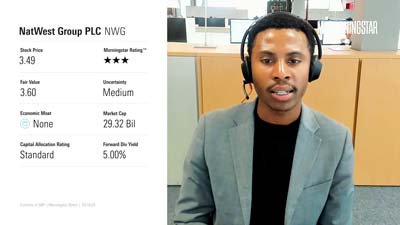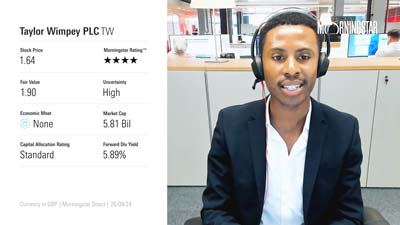(Alliance News) - London's FTSE 100 was higher around midday on Friday, outperforming European peers, as a batch of weak economic data saw traders add to rate cut bets.
The FTSE 100 index rose 52.48 points, 0.6%, at 8,201.52. The FTSE 250 climbed 170.72 points, 0.8%, at 20,520.41, and the AIM All-Share gained 4.33 points, 0.6%, at 730.07.
The Cboe UK 100 was up 0.6% at 824.79, the Cboe UK 250 was up 1.1% at 17,998.02, and the Cboe Small Companies was slightly higher at 15,575.90.
In contrast in Europe, the CAC 40 in Paris was 0.3% lower, while the DAX 40 in Frankfurt shed 0.1%.
Markets were reacting to a slew of weak economic data across the UK and Europe.
UK private sector business activity fractionally declined in November, ending a 12 month streak of growth, amid weaker business optimism since the government's budget, a survey showed.
The flash UK composite purchasing managers' index fell to 49.9 points in November, from a final tally of 51.8 in October. The reading slipped below the 50 mark, which separates growth from decline for the first time in a year, and the PMI fell to a 13-month low.
The flash services PMI also hit a 13-month low, declining to 50 points from October's final tally of 52.0. The manufacturing PMI faded to 48.6 points from 49.9, hitting a nine-month low.
S&P Global Market analyst Chris Williamson said: "Companies are giving a clear 'thumbs down' to the policies announced in the budget, especially the planned increase in employers' National Insurance contributions."
Elliott Jordan-Doak at Pantheon Macroeconomics thinks while a December rate cut is unlikely, the signs of weaker growth, make a February reduction a "slam dunk".
He pointed out the market is now pricing three rate cuts over the next 12 months, and he expects the same.
In a further dent to hopes for economic growth, retail sales fell 0.7% in October from September. They had edged up 0.1% in September from August, downwardly revised from an 0.3% climb.
The monthly result also undershot consensus. A lesser decline of 0.3% was expected, according to FXStreet.
The weak outlook was reflected in Europe where the private sector contracted at the fastest pace seen since January.
The flash PMI composite output index fell to 48.1 in November from 50.0 in October, below FXStreet-cited consensus of 50.0.
"The environment in November is stagflationary. On one hand, activity is declining across the board, while on the other, input and output prices are rising more quickly," commented Cyrus de la Rubia, chief economist, Hamburg Commerical Bank.
One bright piece of news saw Growth from Knowledge's long-running consumer confidence index rose by three points this month in the UK, although it remains firmly in negative territory at minus 18.
The improvement was driven by a jump in intentions to make major purchases – an indicator of confidence in buying big-ticket items – by five points to minus 16 in the run-up to Black Friday next week and eight points higher than this time last year, GfK said.
Sterling and the euro were on the back foot after the figures, falling sharply.
"The outlook for the pound and the euro are both bleak, which only increases the USD’s attractiveness," said Kathleen Brooks at XTB.
"The eurozone data has increased the chance of more rate cuts from the ECB next year. The market is certain that the ECB will cut rates next month, however there is now a decent chance of a 50bp rate cut."
The pound was quoted at USD1.2508 early on Friday afternoon in London, down from USD1.2605 at the time of the European equities close on Thursday. The euro stood at USD1.0411, down from USD1.0491. Against the yen, the dollar was trading at JPY154.36, fading from JPY155.52.
On the FTSE 100, rate sensitive housebuilders were in demand. Vistry climbed 3.3%, Berkeley Group rose 2.1%, Taylor Wimpey gained 2.2% and Barratt Redrow advanced 3.1%.
But banks took a turn into the red. Barclays fell 3.4%, NatWest 2.2% and Lloyds Banking Group 1.8%.
Other gains were spurred by rising commodity prices.
Brent oil was quoted at USD74.26 a barrel early Friday afternoon, up from USD73.52 at the time of the London equities close on Thursday. Gold rose to USD2,703.49 an ounce from USD2,655.01.
Endeavour Mining rose 3.0% and Fresnillo rose 1.1% benefiting from the spike in the yellow metal. Oil major BP edged up 0.2%.
Elsewhere, food retailer J Sainsbury rose 3.3% after it launched the final quarter of its GBP200 million share buyback programme. The GBP50 million buyback will be run by Swiss broker, UBS.
On the FTSE 250, Games Workshop leapt 16% after reporting that trading over the past two months has surpassed expectations.
The Nottingham, England-based miniature wargames maker and retailer said it anticipates pretax profit for the six months to December 1 to stand at GBP120 million, a rise of 25% from GBP96.1 million a year ago.
AJ Bell's Russ Mould thinks the firm has "significant untapped potential in its intellectual property and fantasy worlds. Globally, it has only just begun to explore market opportunities."
"Having staff passionate about games, painting and collecting miniatures is a bonus for its store network. Rather than simply being run by people who just show up to work and perform tasks as requested, the stores are manned by individuals as keen about the subject matter as the customers. That enthusiasm can be infectious and keeps customers loyal and the tills ringing."
US stocks are called to open lower. The Dow Jones Industrial Average is called down 0.2%, the S&P 500 0.3% lower and the Nasdaq Composite 0.4% weaker.
Barclays said: "Following the initial excitement, markets have shifted to guessing game mode about how quickly and strongly Trumponomics policies will be implemented. Headlines about cabinet appointments are likely to drive volatility until the new administration is in place late January."
"We think the new administration and their policies will indeed have a large effect on the shape of the global economy in 2025, with both positives and negatives, but overall likely to help the current reflationary impulse in markets continue into next year."
The broker noted after their initial burst of outperformance, some Trump trades have lost steam in the last week or so.
"This is consistent with our client conversations, where many were well positioned into the election, but have since taken some money off the table," Barclays said.
Still to come, Canadian retail sales at 1330 GMT and the Michigan consumer sentiment index at 1500 GMT.
By Jeremy Cutler, Alliance News reporter
Comments and questions to newsroom@alliancenews.com
Copyright 2024 Alliance News Ltd. All Rights Reserved.
































